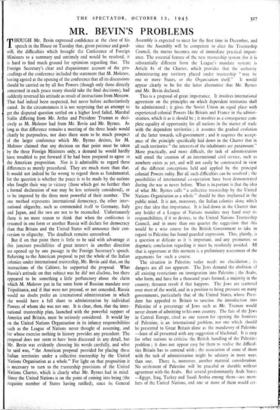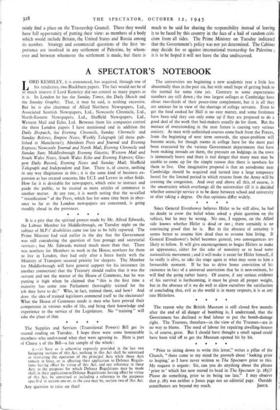MR. BEVIN'S PROBLEMS
91HOUGH Mr. Bevin expressed confidence at the close of his speech in the House on Tuesday that, given patience and good- will, the difficulties which brought the Conference of Foreign Ministers to a summary and untimely end would be resolved, it is hard to find much ground for optimism regarding that. The Foreign Secretary's clear and dispassionate account of the pro- ceedings of the conference included the statement that M. Molotov, having agreed at the opening of the conference that all its discussions should be carried on by all five Powers (though only those directly concerned in each peace treaty should take the final decisions), had suddenly reversed his attitude as result of instructions from Moscow. That had indeed been suspected, but never before authoritatively stated. In the circumstances it is not surprising that an attempt to get, the disputed question settled on a higher level failed, Marshal Stalin differing from Mr. Attlee and President Truman as deci- sively as M. Molotov had from Mr. Bevin and Mr. Byrnes. As long as that difference remains a meeting of the three heads would clearly be purposeless, nor does there seem to be much prospect of the larger conference which Mr. Byrnes desires, for M. Molotov claimed that any decision on that point must be taken by the three Foreign Ministers only, a demand he would hardly have troubled to put forward if he had been prepared to agree to the American proposition. Nor is it admissible. to regard these differences as merely procedural. They are much more than that. It would not indeed be far wrong to regard them as fundamental, for the question is whether the peace is to be made by the nations who fought their way to victory (those which got no further than a formal declaration of war may be less seriously considered), or to be imposed by the three most powerful of their number. The one method represents international democracy, the other inter- national oligarchy, such as commended itself to Germany, Italy and Japan, and the two are not to be reconciled. Unfortunately there is no more reason to think that when the conference is resumed in one form or another Russia will declare for democracy than that Britain and the United States will announce their con- version to oligarchy. The deadlock remains unresolved.
But if on that point there is little to be said with advantage at this juncture possibilities of great interest in another direction are opened up by one passage in the Foreign Secretary's speech. Referring to the American proposal to put the whole of the Italian colonies under international trusteeship, Mr. Bevin said that, on the instructions of the Cabinet, he supported the proposal. What Russia's attitude on that subject was he did not disclose, but there appeared to be something a little perfunctory about the claim which M. Molotov put in for some form of Russian mandate over Tripolitania, and if that were not pressed, or not conceded, Russia would no doubt prefer an international administration in which she would have a full share to administration by individual Powers of whom she was not one. It is clear, then, that the inter- national trusteeship plan, launched with the powerful support of America and Britain, most be seriously considered. It would lay on the United Nations Organisation in its infancy responsibilities such as the League of Nations never thought of assuming, and for whose exercise nothing in history provides any precedent. The proposal does not seem to have been discussed in any detail, but Mr. Bevin was evidently choosing his words carefully, and what he said was, " the American proposal provided for placing these Italian territories under a collective trusteeship by the United Nations Organisation as a whole." For light on that proposition it is necessary to turn to the trusteeship provisions of the United Nations Charter, which is clearly what Mr. Byrnes had in mind. Since the United Nations is on the point of coming into being (the requisite number of States having ratified), since its General Assembly is expected to meet for the first time in December, and since the Assembly will be competent to elect the Trusteeship Council, the matter becomes one of immediate practical import- ance. The essential feature of the new trusteeship system (for it is substantially different from the League's mandate system) is Article 81 of the Charter, which provides that the authority administering any territory placed under trusteeship " may be one or more States, or the Organisation itself" It would appear clearly to be for the latter alternative that Mr. Byrnes and Mr. Bevin declared.
This is a proposal of great importance. It involves international agreement on the principles on which dependent territories shall be administered ; it gives the Soviet Union an equal place with experienced colonial Powers like Britain and France in the admini- stration, which is as it should be ; it involves as a consequence com- plete equality of opportunity for all nations in the matter of trade with the dependent territories ; it assumes the gradual evolution of the latter towards self-government ; and it requires the accept- ance of the principle specifically laid down in the Charter that in all such territories " the interests of the inhabitants are paramount." More practically, and more difficult, the task of administration will entail the creation of an international civil service, such as nowhere exists as yet, and will not easily be constructed in view of the different conceptions held and applied by the principal colonial Powers today. But all such difficulties can be resolved ; the possibilities of international co-operation have been demonstrated during the war as never before. What is important is that the idea of what Mr. Byrnes calls " a collective trusteeship by the United Nations Organisation as a whole " should be thus implanted in the public mind. It is not, moreover, the Italian colonies alone which give that idea that importance. It is laid down in the Charter that any holder of a League of Nations mandate may hand over its responsibilities, if it so desires, to the United Nations Trusteeship Council, and in more than one quarter the suggestion that this would be a wise course for the British Government to take in regard to Palestine has found guarded expression. This, plainly, ;s a question as delicate as it is important, and any premature or dogmatic conclusion regarding it must be resolutely avoided. All that is opportune at this moment is a preliminary assessment of the arguments for such a course. The situation in Palestine today needs no elucidation ; its dangers are all too apparent. The. Jews demand the abolition cf all existing restrictions on immigration into Palestine ; the Arabs, who form, and have for a thousand years formed, a majority in the country, threaten revolt if that happens. The Jews are scattered over most of the world, and in a position to bring pressure on many governments, particularly that of the United States, whose Presi- dent has appealed to Britain to sanction, the introduction into Palestine of a percentage of Jews such as Mr. Truman would never dream of admitting to his own country. The fate of the Jews in Central Europe, cited as one reason for opening the frontiers of Palestine, is an international problem, not one which should be presented to Great Britain alone as the mandatory of Palestine —least of all presented with any suggestion of blackmail. It is easy for other nations to criticise the British handling of the Palestin: problem ; it does not appear easy for them to realise the difficul- ties Britain has to contend with ; the association of some of them with the task of administration might be salutary in more ways than one. There is, moreover, another material consideration. No settlement of Palestine will be peaceful or durable without agreement with the Arabs. But several predominantly Arab States —Egypt, Iraq, Turkey and Saudi Arabia among them—are mem- bers of the United Nations, and one or more of them would ccr-



























 Previous page
Previous page